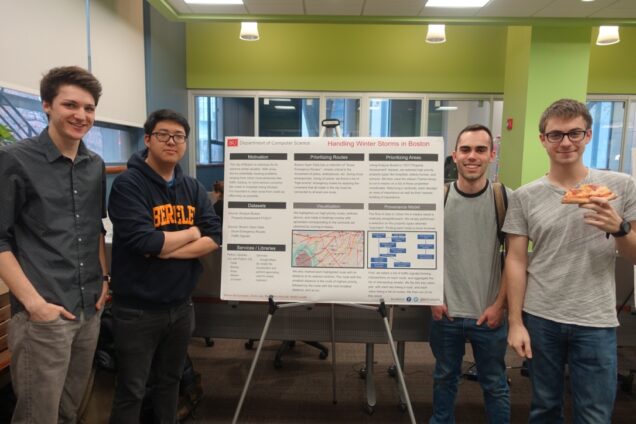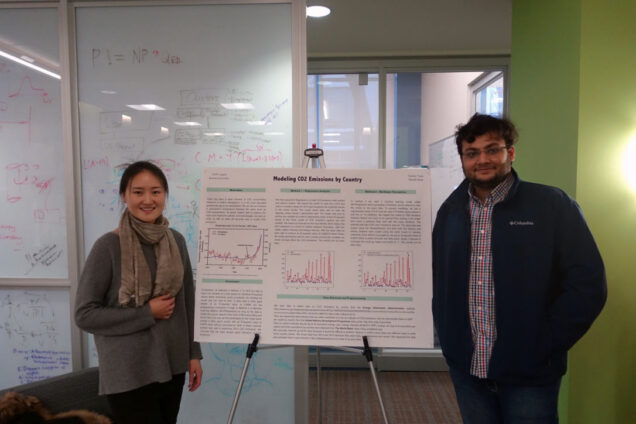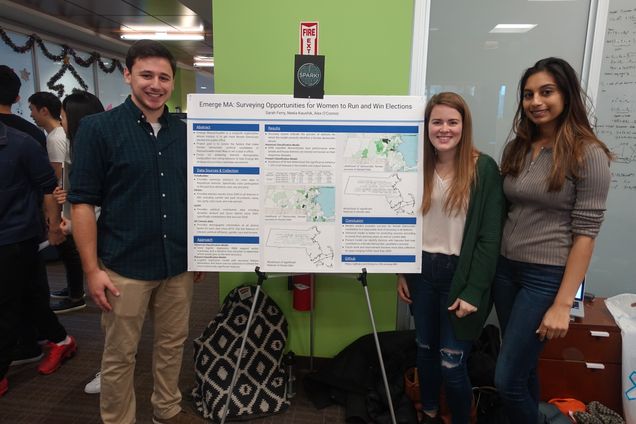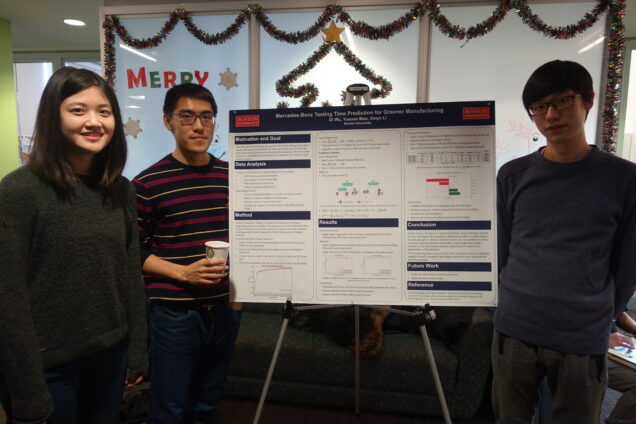Over 200 Students Present Computational & Data-Driven Research at Hariri
[Return to Nexus Newsletter]
By Sabrina Charania
As part of its commitment to enriching the student research experience at BU, the Hariri Institute for Computing supports several computer science (CS) courses that provide experiential learning opportunities to students. These opportunities give students a chance to exchange ideas with industry leaders and allow them to explore how computational perspectives can play into both their education and career paths. At the culmination of course work, the Institute hosts public poster sessions that give students the opportunity to showcase their work amongst peers, faculty, and external partners; this past fall the Institute was pleased to host poster sessions for four computer science courses, Data Mechanics (CS 591), Machine Learning (CS 542), Tools for Data Science (CS 506), Spark Ventures (CS 491), and Mobile App Development (CS591).

Andrei Lapets, CS Associate Professor of the Practice and Director for Research Development and SAIL taught his popular Data Mechanics course again this past fall. Students Steven Brzozowski, Chris Joe, Benjamin Kincaid, and Keith Lovett used the project as an opportunity to improve how winter storms are handled in Boston. The model they developed uses optimization methods to set large institutes, such as hospitals, as a focal point to be prioritized when plowing snow. Their model can be used by the City of Boston’s Public Works Department to understand how different parts of the city can be prioritized in snow storm preparations.

Another pair of students, Yuchen Yuan and Maulik Shah, developed a model that can be used to estimate CO2 emissions by country as well as predict the next year’s emission. Using regression and multilayer perceptrom methods, they analyzed income per capita, energy use, carbon intensity and population intensity to calculate the CO2 emission. Their model can be used by governments to set or change CO2 emission regulations.
Kate Saenko, director of the Computer Vision and Learning Group and leader of AI Research (AIR) Initiative, which is housed at the Hariri Institute, taught the Machine Learning course this fall. Sudents Duaa Tashkandi, Wdjan Alharthi, Ben Gaudiosi and Shreya Ramesh focused their project on identifying Brazilian names out of a large pool of names. The company Digaai is planning on using this project to be able to track the spread of Brazilian culture and influence in America, and specifically in Massachusetts. They also plan on using this to track Brazilian voting statistics in the state (e.g. ratio of registered to actual Brazilian voters).
Jueru Jin, Haoyuan Liu, Yehui Huang and Han Xiao chose to research multi-class photo tagging. Their project aims to make it easier for people to tag photos on Windows on Earth. The program currently tags photos into 11 predefined categories and cannot make new tags. However, this is a major improvement since there are about 11,000 photos that can be tagged into these groups and this program saves several hours of human effort that would have gone into manually tagging these 11,000 photos.
Natalya Shelchkova, Colin Stuart, Jordan Love and Varsha Achar used their project as an opportunity to optimize a dating app. Their project added features to an app called Hater which matches people based on mutual dislikes rather than likes. The group added features to track users returning to the app, filter spam out more effectively, and match people more accurately. The group believes that these features could be used to track changes in societal trends and perceptions if the information from these features is monitored over time.

In the Tools for Data Science course, taught by Mark Crovella, professor and chair of the Department of Computer Science, students pursued a wide range of data-driven investigations, many of which were developed in collaboration with BU Spark! partners such as NECIR, Thomson Reuters, Citizens for Juvenile Justice, and many others. Sarah Ferry, Neela Kaushik and Alex O’Connor worked with Emerge Massachusetts (nonprofit organization with mission to get more female democrats elected into public office) to find factors that make female democratic political candidates more likely to win. They developed a model that identifies districts with features that contribute to a female democratic candidate’s success by using election, voting behavior, demographics of candidates, and political contribution data from previous years. Analysis showed which parts of states are likely to hold female candidates with reasonable accuracy (compared to the finalized analysis of the data with the current females siting in House of Representatives).

Di Wu, Yuxuan Mao and Xinyu Li worked with Mercedes-Benz in testing the time prediction for greener manufacturing. They received a dataset (4209 trainning and testing samples with anonymous features names) from Mercedes-Benz and used various techniques such as forward step-wise feature selection, regression and Xgboost to determine which features help increase the speed of the robust testing system and decide which techniques perform best. Mercedes-Benz can use the data analysis to explore important features of their testing process and work to reduce overall testing times.
